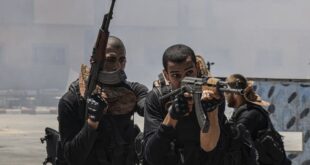RAMALLAH — As thousands thronged the streets of Gaza for the funeral of seven people killed Friday in an Israeli shelling, Palestinian President Mahmoud Abbas upped the tensions between him and the Hamas-led Palestinian government by announcing a July 26 referendum on the so-called Prisoners’ Document.
Both Abbas and Prime Minister Ismail Haniyeh had earlier condemned in the strongest terms the shelling that hit a beach side picnic, and killed five members of the Ghalya family, including the parents, a four-month-old, a three-year-old and a 10-year-old. Three other people died and 20 people were wounded.
Hamas’ military wing, the Izzedine Al Qassam Brigades, also announced that it would end a truce it alone had adhered to since March 2005, and Friday night and early Saturday lobbied a volley of rockets at Israeli targets from the Gaza Strip.
Abbas said Israel had committed “a horrible, dangerous and ugly massacre.†Haniyeh described it as a “war crime.†But that small moment of inter-factional agreement did not stop Abbas setting his July deadline yesterday in the face of stiff Hamas resistance.
“As chairman of the PLO Executive Committee and president of the Palestinian Authority, I have decided to exercise my constitutional right and duty to hold a referendum over the document of national agreement,†Abbas said in a decree read by an aide at the presidential headquarters in Ramallah.
Palestinians will be asked to vote “yes†or “no†on the question: “Do you agree with the document of national agreement — the Prisoners’ Document?†aide Tayeb Abdel Rahim said.
But Hamas was quick to denounce the move. Hamas spokesman Mushir Al Masri called it a “declaration of a coup against the government,†and urged Palestinians to boycott the vote.
Haniyeh, meanwhile, said he would meet Abbas in Gaza “to explain to him the dangers of the referendum, which could cause historical divisions among the Palestinian people.â€
Hamas has rejected international demands that it recognise Israel, renounce the armed resistance and adhere to previously signed agreements between the Palestinian Authority and Israel. Subsequent sanctions against dealing with the Palestinian government have debilitated the economy and raised fears among international aid organisations of a full-scale humanitarian disaster.
The Prisoners’ Document calls among other things for the establishment of a Palestinian state on 1967 borders, which is seen as an implicit recognition of Israel.
Abbas sees a vote in favour of the document as a way to end the Western-led economic sanctions that have crippled the Palestinian economy. The Palestinian president also believes it will be a basis to restart peace negotiations with Israel.
However on May 31, the UN special envoy to the peace process, Alvaro de Soto, said even if the referendum was passed it would unlikely be enough to see sanctions lifted.
And in an interview with the British newspaper The Independent published Friday, Israeli Prime Minister Ehud Olmert described the document as “meaningless.†Israeli officials have earlier said Olmert considers the document “absolutely unacceptable and the basis for nothing.â€
The controversy over the referendum has added to inter-factional tension that has intermittently erupted in clashes in the last month killing more than 16.
At a separate funeral yesterday for a PA security officer, Bassam Qutub, killed in a botched Hamas kidnapping attempt according to Palestinian Preventive Security officials, a gunbattle erupted between gunmen from Hamas and members of the Fateh-dominated force. The car of Gaza’s top security official, Rashid Abu Shbak, was caught in the cross-fire, and he was rushed out of the area.
Four people were wounded in the fighting, one of them seriously, hospital officials said.
Furious over Qutub’s killing, Fateh yesterday boycotted a meeting with Haniyeh. The meeting was aimed at calming the tensions between the groups, but Fateh spokesman Tawfiq Abu Khoussa said Hamas had committed a “number of violations†in recent days, including killing Qutub.
 Eurasia Press & News
Eurasia Press & News
